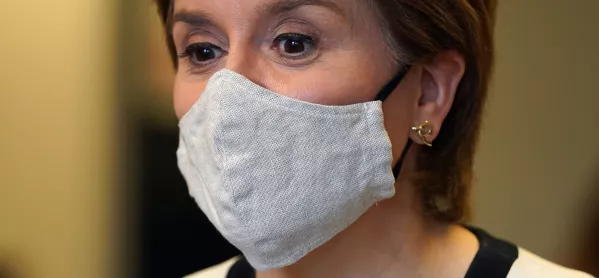Schools promised Covid clarity well before new year

Schools will have clarity on changing Covid rules well before the start of the new school year, Scotland’s first minister, Nicola Sturgeon, promised this afternoon.
Parliament was recalled today for Ms Sturgeon to confirm that the country would moved to Level 0 - the lowest level of Covid restrictions - on Monday 19 July, with some modifications including a continuing demand that employers “support home working where possible”.
But schools will have to wait until a later date to get the clarity they seek on issues such as self-isolation requirements.
Ms Sturgeon’s statement made only a passing reference to education, despite her indicating last week that some significant details for schools could be revealed today.
Background: 85% of Scotland’s teachers to be jagged by next term
News: Teen vaccines could prevent school disruption
In England: What Covid unlocking means for schools
Also today: Why I launched a campaign for teacher job security
In her parliamentary statement, Ms Sturgeon said that, “as part of our preparations for the new academic term, we have asked our [Covid] education advisory group for advice on whether, to what extent and with what mitigations we can remove the self-isolation requirement for young people in education settings who are close contacts of positive cases. We will set out our conclusions well in advance of the new term”.
Covid: What restrictions will be in place in schools next term?
She added: “We are, of course, still waiting for advice from the JCVI [Joint Committee on Vaccination and Immunisation] on whether children over 12 should be vaccinated.”
In a previous Covid statement last week, Ms Sturgeon had said she would set out “more thinking” on the mitigations in schools needed after the summer - including the need for pupils to stay in the same group, or bubble - on 13 July, and that “before schools go back [from the summer break] we will give absolute clarity on what the position there will be”.
Today, she said of Scotland’s overall strategy for emerging from the pandemic that “we must stick to a cautious approach”.
She added: “We are easing restrictions next week - but we are not abandoning them.
“And even when we move beyond Level 0, we will continue to require some baseline measures such as face coverings.”
Scottish Labour education spokesperson Michael Marra tweeted yesterday: “Children can’t have another year of disrupted learning, yet the government haven’t told us what steps they are taking to prevent it.”
His party has set out a three-point plan to “pandemic-proof our classrooms”:
- Include school staff in any booster vaccine programme as a priority.
- Increase testing in schools to monitor the virus’ prevalance.
- Introduce a classroom ventiliation inspection programme and have active ventilation in all classrooms that require it.
Children can’t have another year of disrupted learning, yet the government haven’t told us what steps they are taking to prevent it.
- Michael Marra MSP (@michaeljmarra) July 12, 2021
We’re calling on them to back our plan of action to help pandemic-proof the classroom. Sign our petition ?https://t.co/ppwQP7zEgk
Restrictions still remain fairly significant in Scotland’s Level 0 compared with England’s “freedom day”, which is also set for 19 July. Prime minister Boris Johnson has said almost all restrictions, including masks, bubbles and contact tracing, can be ditched by schools, while in wider society distancing and the wearing of masks will end from that day.
Ms Sturgeon has been at pains to stress that the Scottish government’s planned changes on 19 July are not the same as England’s “complete lifting”.
She has emphasised the need for continued caution, citing one of the key reasons as the unknown impact of the coronavirus on young people, saying last week: “I don’t think we can just experiment with our young people.”
Today, she said: “Many people, including young people, who get the virus but never need hospital care will still suffer long Covid. This is a condition that experts don’t yet fully understand, but we know that it is causing misery for many.
“Indeed, it is one of the main reasons that we cannot be complacent about young people getting the virus.
“To say that it doesn’t matter - when we don’t yet fully understand what the long-term consequences might be - would risk treating the younger generation as an experiment. We should not do that.”
She underlined that, while there are a number of “welcome signs” - with cases appearing to have “levelled off” and vaccinations “weakening the link between case numbers and severe acute illness” - there remain “reasons to be concerned...about the current level of infection”.
Tes Scotland recently revealed that, come mid-August and the return to school, Public Health Scotland is projecting that 85 per cent of teachers will have received two doses of Covid vaccine.
You need a Tes subscription to read this article
Subscribe now to read this article and get other subscriber-only content:
- Unlimited access to all Tes magazine content
- Exclusive subscriber-only stories
- Award-winning email newsletters
Already a subscriber? Log in
You need a subscription to read this article
Subscribe now to read this article and get other subscriber-only content, including:
- Unlimited access to all Tes magazine content
- Exclusive subscriber-only stories
- Award-winning email newsletters